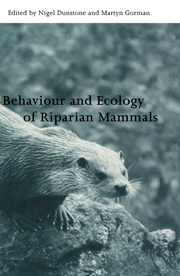Book contents
- Frontmatter
- Contents
- List of contributors
- Preface
- 1 Adaptations to the semi-aquatic habit and habitat
- 2 Physiological challenges in semi-aquatic mammals: swimming against the energetic tide
- 3 Diving capacity and foraging behaviour of the water shrew (Neomys fodiens)
- 4 Habitat use by water shrews, the smallest of amphibious mammals
- 5 The importance of the riparian environment as a habitat for British bats
- 6 A preliminary study of the behaviour of the European mink Mustela lutreola in Spain, by means of radiotracking
- 7 The demography of European otters Lutra lutra
- 8 Habitat use and conservation of otters (Lutra lutra) in Britain: a review
- 9 The relationship between riverbank habitat and prey availability and the distribution of otter (Lutra lutra) signs: an analysis using a geographical information system
- 10 Influence of altitude on the distribution, abundance and ecology of the otter (Lutra lutra)
- 11 Diets of semi-aquatic carnivores in northern Belarus, with implications for population changes
- 12 Otter (Lutra lutra) prey selection in relation to fish abundance and community structure in two different freshwater habitats
- 13 Diet, foraging behaviour and coexistence of African otters and the water mongoose
- 14 Feeding ecology of the smooth-coated otter Lutra perspicillata in the National Chambal Sanctuary, India
- 15 Population trends of hippopotami in the rivers of the Kruger National Park, South Africa
- 16 Reproductive strategies of female capybaras: dry-season gestation
- 17 The continuing decline of the European mink Mustela lutreola: evidence for the intraguild aggression hypothesis
- 18 Otters and pollution in Spain
- 19 The rapid impact of resident American mink on water voles: case studies in lowland England
- 20 Status, habitat use and conservation of giant otter in Peru
- Index
Preface
Published online by Cambridge University Press: 03 May 2010
- Frontmatter
- Contents
- List of contributors
- Preface
- 1 Adaptations to the semi-aquatic habit and habitat
- 2 Physiological challenges in semi-aquatic mammals: swimming against the energetic tide
- 3 Diving capacity and foraging behaviour of the water shrew (Neomys fodiens)
- 4 Habitat use by water shrews, the smallest of amphibious mammals
- 5 The importance of the riparian environment as a habitat for British bats
- 6 A preliminary study of the behaviour of the European mink Mustela lutreola in Spain, by means of radiotracking
- 7 The demography of European otters Lutra lutra
- 8 Habitat use and conservation of otters (Lutra lutra) in Britain: a review
- 9 The relationship between riverbank habitat and prey availability and the distribution of otter (Lutra lutra) signs: an analysis using a geographical information system
- 10 Influence of altitude on the distribution, abundance and ecology of the otter (Lutra lutra)
- 11 Diets of semi-aquatic carnivores in northern Belarus, with implications for population changes
- 12 Otter (Lutra lutra) prey selection in relation to fish abundance and community structure in two different freshwater habitats
- 13 Diet, foraging behaviour and coexistence of African otters and the water mongoose
- 14 Feeding ecology of the smooth-coated otter Lutra perspicillata in the National Chambal Sanctuary, India
- 15 Population trends of hippopotami in the rivers of the Kruger National Park, South Africa
- 16 Reproductive strategies of female capybaras: dry-season gestation
- 17 The continuing decline of the European mink Mustela lutreola: evidence for the intraguild aggression hypothesis
- 18 Otters and pollution in Spain
- 19 The rapid impact of resident American mink on water voles: case studies in lowland England
- 20 Status, habitat use and conservation of giant otter in Peru
- Index
Summary
Many species of mammals live in close association with rivers and streams, often feeding in them and frequently using them as a place of safety and as a means of escape from predators. Modifications of species for swimming and diving may involve such profound anatomical and physiological specialization that they are at a relative disadvantage to terrestrial species when on land. Indeed, the degree of aquatic specialization exhibited may be a corollary of the frequency with which an animal needs, on occasion, to return to a terrestrial life. The mammal exploiting a semi–aquatic lifestyle often suffers other limitations in addition to those consequent upon its habitat–specific adaptations. For example, in recent years many of our rivers have become highly polluted, draining as they do a highly modified landscape where bankside modification for agriculture/forestry, enhanced water flow, or recreation, has further reduced their suitability for the highly specialized animals that inhabit them.
In November 1995 a conference on the subject of the Behaviour and Ecology of Riparian Mammals was held at the Meeting Rooms of the Zoological Society in London. The idea behind the symposium was to bring together scientists from a range of disciplines but all researching the behaviour and ecology of a group of mammals united by their adherence to a semi–aquatic lifestyle. It was hoped that such a comparative approach would lead to a clearer understanding and would be of value to those charged with the task of undertaking their conservation and management.
- Type
- Chapter
- Information
- Behaviour and Ecology of Riparian Mammals , pp. ix - xPublisher: Cambridge University PressPrint publication year: 1998



